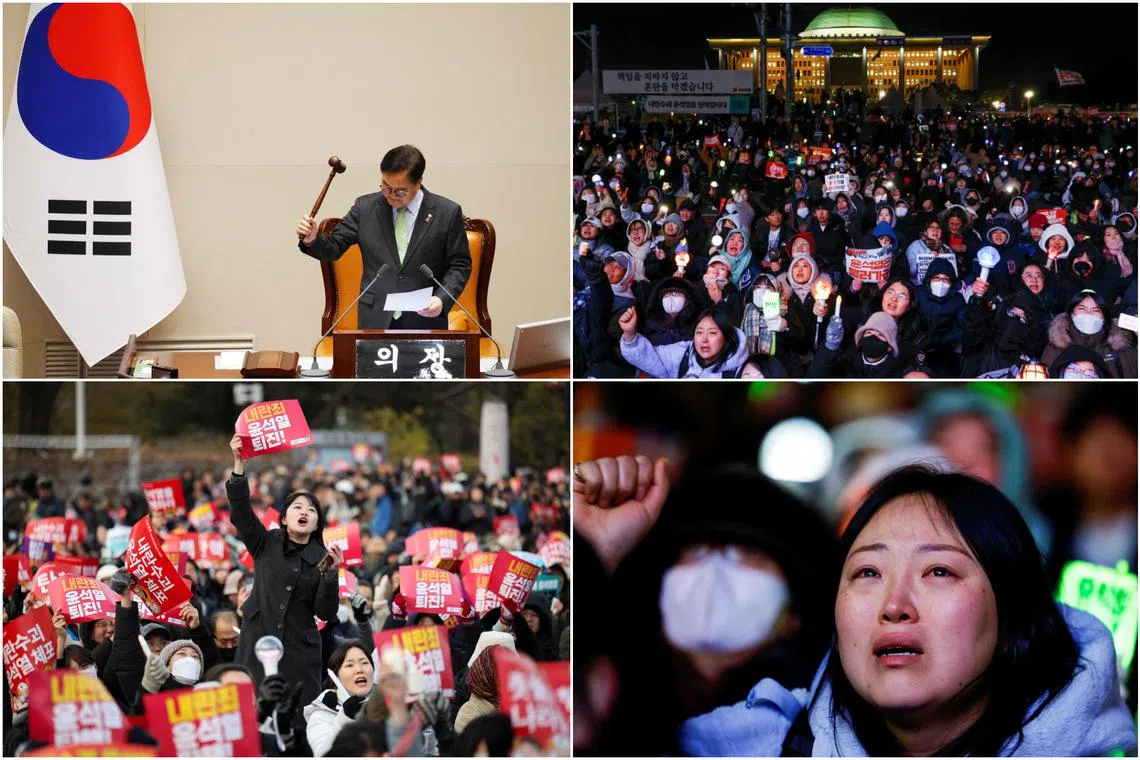Martial law, protest, walkout: South Korea’s wild week
Sign up now: Get insights on Asia's fast-moving developments

A look at recent events in a country thought to have consigned dictatorships to history.
PHOTOS: AFP, REUTERS
SEOUL - South Korea has been in turmoil since President Yoon Suk Yeol imposed martial law
With Mr Yoon having survived an impeachment motion in Parliament on Dec 7, AFP looks at recent events in a country thought to have consigned dictatorships to history.
Prelude
Mr Yoon, elected in 2022, lurches from crisis to crisis and becomes a lame duck after the opposition wins control of Parliament in elections in April this year.
One lawmaker, Mr Kim Min-seok, in September claims Mr Yoon has martial law in mind, but almost no one takes it seriously.
National address
On Dec 3 at 10.23pm local time, Mr Yoon, following a budget tussle with the opposition, comes on television to declare martial law.
The aim was to protect the country from “threats posed by North Korea’s communist forces and to eliminate anti-state elements plundering people’s freedom and happiness,” Mr Yoon said.
Defiance
Opposition leader Lee Jae-myung live-streams himself being driven to the National Assembly
An emergency session is scheduled for later that night, and lawmakers scramble to Parliament, some leaping over fences, to vote down Mr Yoon’s decree.
Helicopters
Helicopters carry special forces to Parliament, as other troops scale perimeter fences and smash windows to get in.
Sometime after midnight, soldiers attempt to enter the main Parliament, with scuffles breaking out as staff and lawmakers bar their way with office furniture as barricades.
As news of Mr Yoon’s stunning move spreads at home and abroad, thousands of protesters make their way to Parliament.
Rejection
At 1.03am on Dec 4, lawmakers vote 190-0 to nullify Mr Yoon’s declaration.
Soon after, soldiers begin withdrawing. Protesters chant: “Arrest Yoon Suk Yeol!”.
“We are watching the recent developments in (South Korea) with grave concern,” the US State Department says.
Hours pass and finally at 4.20am, Mr Yoon comes on television again and says he will lift martial law. Protesters celebrate. Mr Yoon goes to ground.
Impeachment motion
As bleary-eyed protesters and lawmakers recover, six opposition parties file an impeachment motion against Mr Yoon at 2.40pm on Dec 4.
Mr Yoon “gravely and extensively violated the Constitution and the law” and sought to “evade imminent investigations... into alleged illegal acts involving himself and his family”, the motion says.
Opposition lawmakers also file separate complaints of “insurrection” against Mr Yoon, his defence and interior ministers and key military and police officers.
Thousands of protesters begin marching to towards the presidential office while others rally at the National Assembly.
Defence Minister Kim Yong-hyun offers to resign. Later he is slapped with a travel ban.
Enquiry
On Dec 5, the head of Mr Yoon’s People Power Party (PPP), Mr Han Dong-hoon, says it will block the impeachment motion. Only eight of its 108 MPs need to break ranks for it to pass.
Police announce they are investigating Mr Yoon and others for “insurrection”, and lawmakers start to grill those involved.
General Park An-su says he only found out on television that martial law had been declared, and subsequently that he was in charge of the operation.
He said he signed a decree banning anti-government political activities after being told the defence minister had checked its legality.
Han turns
On Dec 6 morning, Mr Han warns that South Korea is in “great danger” if Mr Yoon remains in office, implying the president could declare martial law again.
Mr Han says “credible evidence” suggests that Mr Yoon ordered the arrest of key politicians. A fresh poll on Mr Yoon’s approval rating hits a record low of 13 per cent after the declaration of martial law.
Special Forces Commander Kwak Jong-geun says he was ordered to “drag out” lawmakers from Parliament. Three senior commanders are suspended.
US Secretary of State Antony Blinken tells his counterpart Cho Tae-yul that Washington “expects the... democratic process to prevail”.
Impeachment looks increasingly likely. Opposition MPs hole up in Parliament all night, and protesters hunker down outside in freezing temperatures.
“With the impeachment vote set for tomorrow, the hours leading up to it are extremely precarious,” opposition leader Lee tells AFP.
D-Day
Despite Mr Han’s comments, the PPP decides late on Dec 6 that it will still vote against the impeachment vote, scheduled for Dec 7 evening.
On Dec 7 at 10am, Mr Yoon finally reappears, and in a two-minute televised address, apologises for the “anxiety and inconvenience”.
But he stops short of resigning.
“I will leave it up to our party to stabilise the political situation in the future, including my term of office,” he says.
Boycott
In party mood, tens of thousands of anti-Yoon protesters rally outside Parliament. Police put their numbers at 150,000, organisers at one million.
But just before the vote, all but a handful of PPP MPs file out and only three cast ballots, prompting shouts of “accomplices to insurrection” from the opposition.
As protesters boo and in some cases weep, after several hours, the motion is finally declared defeated just before 10pm – and Mr Yoon survives. AFP


